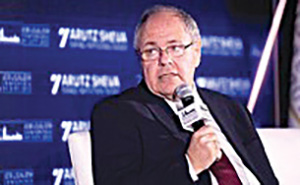|
Getting your Trinity Audio player ready...
|
Chairman of Yad VaShem Condemns Elon Musk’s Comments on Germany’s Holocaust Remembrance
Edited by: Fern Sidman
Dani Dayan, the chair of Yad Vashem, Israel’s Holocaust memorial in Jerusalem, has strongly criticized Elon Musk’s recent remarks suggesting that Germany places “too much focus on past guilt.” Speaking on X (formerly Twitter), Dayan stated that confronting the atrocities of the past is not only a moral obligation but essential for safeguarding Germany’s democratic future. His comments come amidst growing international debate over historical accountability and rising far-right sentiments in Europe, as was reported on the Vois Es Nais web site.
Yad Vashem director Dani Dayan strongly contradicts Elon Musk’s claim about the German culture of remembrance. Not remembering the Holocaust is “an insult to the victims of the Nazis and a clear danger to the future of Germany.” https://t.co/bFmOJfK6l3
— Paulo Cunha (@ernestoport) January 26, 2025
Musk made his controversial statement while addressing a rally for Germany’s far-right Alternative for Germany (AfD) party, saying, “Children should not feel guilty for the sins of their parents — their great-grandparents even.” Referring to the Holocaust and World War II, Musk advocated for Germany to “move beyond” its past. Dayan responded emphatically on X, asserting, “Contrary to Elon Musk’s advice, the remembrance and acknowledgement of the dark past of the country and its people should be central in shaping German society.” This, Dayan argued, is not only a tribute to the victims of Nazism but also a safeguard against the erosion of democratic values. VIN News highlighted the backdrop of Dayan’s critique, as it coincides with a resurgence of right-wing populism in Europe.
Contrary to @elonmusk advice, the remembrance and acknowledgement of the dark past of the country and its people should be central in shaping the German society. Failing to do so is an insult to the victims of Nazism and a clear danger to the democratic future of Germany. https://t.co/DzR5mxg9CD
— Dani Dayan (@AmbDaniDayan) January 26, 2025
Musk’s remarks have sparked a broader backlash, as they were made shortly before International Holocaust Remembrance Day, observed on January 27. Dayan described Musk’s comments as an “insult to the victims of Nazism” and warned of the dangers posed by downplaying historical atrocities. As noted in the VIN News report, the timing of Musk’s remarks has drawn particular ire, given the global commemoration of Holocaust victims and survivors. Dayan’s critique underscores the importance of historical reckoning in the face of modern threats to democracy.
In recent days, Musk has faced additional controversies, including accusations of making a Nazi salute during an event celebrating President Donald Trump’s inauguration. Though Musk denied the allegations and received support from Israeli Prime Minister Benjamin Netanyahu, who called the accusations a “false smear,” the incident has added fuel to the fire. According to the information provided in the VIN News report, Musk further stoked outrage by posting a series of Nazi-related jokes on X, deepening concerns about his comments on Germany’s historical reckoning.
It is worth noting that last year, Musk visited Auschwitz ahead of Holocaust Remembrance Day, where he lit a candle and laid a wreath at the site of the former concentration camp. Despite this act of remembrance, his recent comments suggest a conflicting perspective on the importance of Holocaust memory. VIN News reported that Dayan’s condemnation reflects the broader sentiment of Holocaust educators and activists who view remembrance as vital to preventing history from repeating itself.
As the world prepares to mark International Holocaust Remembrance Day, Dayan’s response serves as a sobering reminder of the continued need for historical awareness. The debate sparked by Musk’s remarks calls attention to a critical tension between acknowledging the past and navigating modern political narratives. For Yad Vashem and other institutions dedicated to Holocaust memory, the message is clear: the lessons of history must remain central to the foundation of democratic societies.




